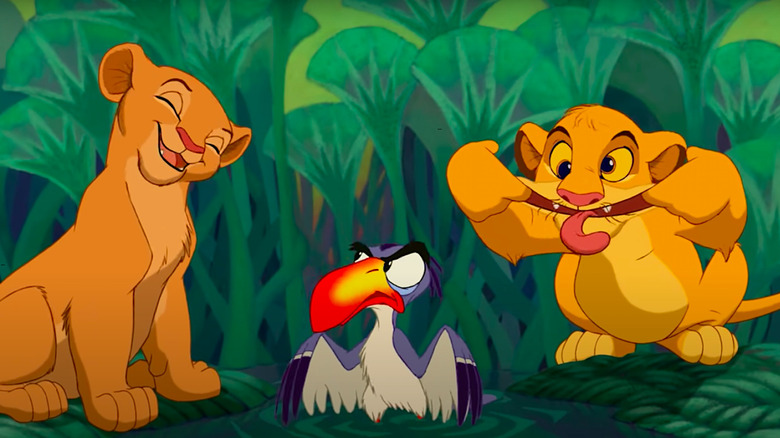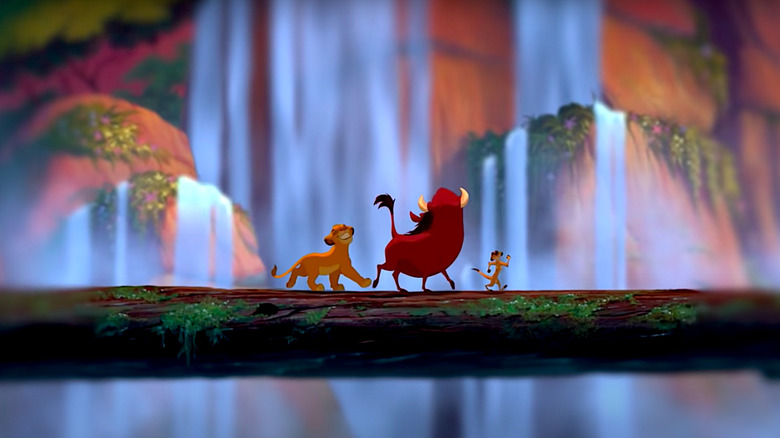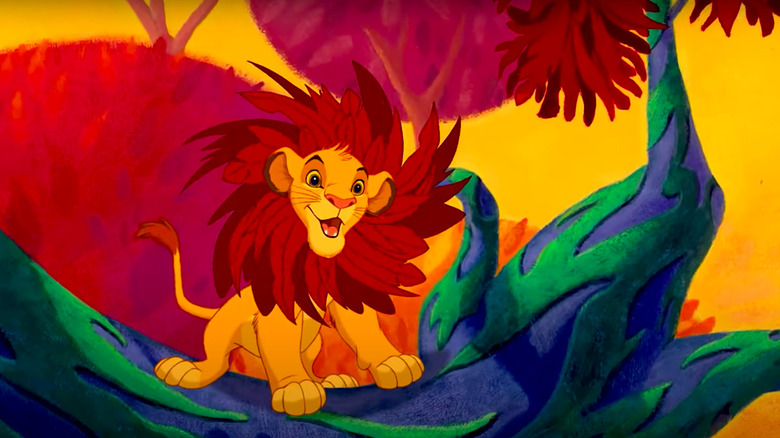Why Disney Was Surprised By Lion King's Massive Success
Today, you'd be hard-pressed to find someone who has absolutely no knowledge of Disney's "The Lion King." It is considered a classic children's film, as well as one of Disney's best movies to date. Many people list it as their favorite Disney movie of all time, and nearly everyone who's seen it still hasn't fully recovered from the trauma of having to watch Mufasa get brutally murdered by his jealous brother, Scar.
Released in theaters in 1994, "The Lion King" is chockfull of amazing actors like Matthew Broderick, Jeremy Irons, and James Earl Jones who bring life to the animals of the Pride Rock. It has a stunning score with some of the most memorable songs in musical history ("Hakuna Matata" is an absolute bop, but "I Just Can't Wait to Be King" is where it's at), and nothing will make you sympathize more with an anthropomorphized animal than when Mufasa's ghost appears in the sky and tells Simba to remember who he is. By all accounts, "The Lion King" is a near perfect film, which makes the fact that Disney originally didn't think it would be much of a success all the more surprising.
An unlikely success was just around the riverbend
When "The Lion King" was first pitched, it did not have a lot of support. People simply didn't think the story would be captivating enough for audiences. In fact, when it was time to start work on the film, animators at Disney chose to provide their talents to "Pocahontas" — which was also being developed at the same time — instead. According to Huffpost, "Pocahontas" was "the company's "A-movie," and "The Lion King" its "B-movie," which meant that most of the resources available for making a film went to that so-called re-telling of Jamestown history.
It's true that "The Lion King" is a bit of a stretch from some of Disney's other films. For starters, it involves a cast entirely made up of animals — there is not a single person that makes an appearance throughout the entire film — and it tends to deviate away from Disney's "princess" storyline, swapping the typical Belle or Cinderella character for a young, lion cub vying for his rightful place on the throne. In contrast, "Pocahontas" was the more traditional of the two films, and was thus given the label of "more likely to be a success."
The irony is that "The Lion King" went on to become a major blockbuster smash when it was released in June 1995. The film grossed over a million dollars its first weekend when it was playing in just two theaters, and then went on to gross over $40 million the following weekend for its wide release. When it finally left theaters in February of 1996, the movie had made over $300 million domestically in profit.
"Pocahontas," on the other hand, didn't do nearly as well upon its initial release, only making slightly over $100 million domestically by the time it finally left theaters. Of course, numbers don't mean everything, but in the case of "Pocahontas" vs. "The Lion King," it was pretty clear that the movie about the talking lions was the bigger success.
The people of Disney were pleasantly surprised by the success of "The Lion King," and the movie has gone on to see tons of sequels and spin-offs. The Broadway version of the story is still running too, and the movie has already been given Disney's new, signature live-action treatment. While the live-action remake was met with less fervor than its original, it's safe to say that the story of Simba and the Pride Lands is here to stay.
So what makes The Lion King so great?
There are a lot of reasons why "The Lion King" is beloved, and much of it has to do with the movie's superb story. Heavily influenced by Shakespeare's "Hamlet," the story of Simba and his family is full of all the delicious, juicy plot details audiences love. Scar, the conniving and jealous younger brother of King Mufasa, is desperate to make his way to the throne, so much so that he's willing to kill to get there. He's a cruel, selfish lion whose quest for power outweighs his family allegiance, and because of him, the events of "The Lion King" are set into motion, making him the engine for the drama that unfolds at Pride Rock. While we loathe him, there's no denying that his villainy is top-notch.
The movie also provides a riveting plot that falls outside of Disney's more traditional "woman pining for an unreachable man" storyline, and it instead gives its viewers something a little meatier to chew on. Not only is "The Lion King" a story about love, but it's also a story about family, loyalty, and finding your rightful place within the circle of life. Parents are gifted rich topics to discuss with their children after watching the movie, and the film has a weight to it that movies like "The Little Mermaid" or "Cinderella" seem to lack at times. Yes, Simba and Nala eventually make their way to falling in love, but their romantic journey takes a back seat to the more moving journey of staying true to who you are and where you are from.
Overall, it's no surprise to me that "The Lion King" ended up being as huge of a success as it is. It's a beautiful story that tugs at the heartstrings more than once throughout the film's runtime. But it's also a whole lot of fun! Visually, the movie bursts with action and color, and it's hard to watch some of the songs without breaking into a huge smile. Disney did an incredible job creating emotion in its cast of lions and meerkats and warthogs, and to this day, the characters of "The Lion King" are some of the most memorable of all of Disney's creations. Just like Simba, "The Lion King" surpassed expectations and rose up to take its rightful place on the throne.


